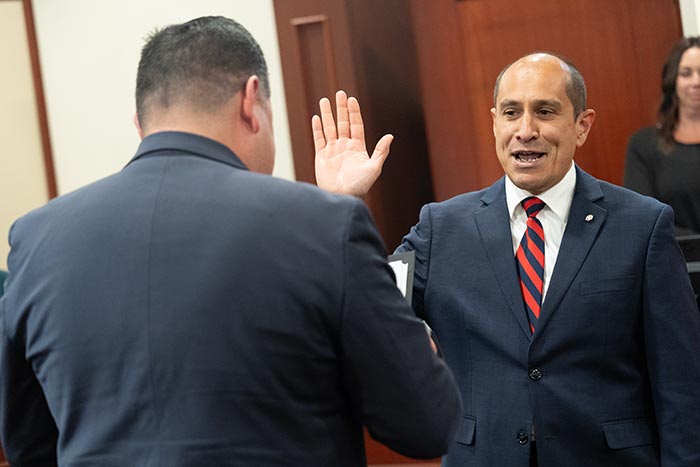Golden State, city attorneys go head-to-head at council meeting
The city’s eminent domain case against Golden State Water Company (GSW) was once again a big topic of conversation at the Claremont City Council meeting June 25. Council unanimously adopted two amended resolutions authorizing the acquisition of the Claremont water system, and approved the filing of an amended complaint in the eminent domain lawsuit.
The amendments were made to address an April 30 ruling by Los Angeles County Superior Court Judge Richard Fruin, who ordered the city to file an amended complaint within 60 days after GSW sought to dismiss the eminent domain case.
Unlike previous council meetings with water acquisition items on the agenda, the audience was sparse aside from city staff, attorneys and a few residents. City Manager Tony Ramos and City Attorney Sonia Carvalho addressed council briefly before opening the floor to attorney Ken MacVey, who is representing the city in the lawsuit against the water company.
“The primary focus of this hearing today is to deal with certain amendments to the resolutions of necessity,” said Mr. MacVey. “Those amendments focus on clarifications and additions to the property descriptions. The same findings that were considered in the prior hearing on the resolutions of necessity are to be considered today.”
Mayor Corey Calaycay then opened up the public hearing, with the city clerk noting it had received a written objection from Golden State Water’s attorney dated June 18, 2015. George Soneff, who represents GSW, took to the podium with additional objections.
According to Mr. Soneff, the listed real estate parcels by the city aims to take from Golden State inexplicably excludes parcels that are part of the Claremont water system.
“To cite just one example, Golden State owns a parcel, about one-quarter acre that contains a well and a pump house—the Pomello site—that is apparently not being taken by the city and is left to Golden State,”?Mr. Soneff said to council.
He went on to describe other properties that provide service to Claremont as part of the system that are not being sought by the city in its takeover.
“Taking only a part of the properties creates a stranded asset, causing severance damages,”?he said. “The city has failed to appraise those stranded assets as the law requires.”
Mr. MacVey disagreed and urged Mr. Soneff to review Golden State’s own filings.
“The [Pomello] well is no longer identified in operation and has been taken out of the facilities index,” Mr. MacVey said on behalf of the city. “What is being acquired is property that is necessary to acquire the system. Golden State Water can sell what we don’t take. And that’s not a bad thing.”
Mr. Soneff asserted that the city’s list of desired real estate includes properties that Golden State does not own, such as an empty lot on Harrison Avenue, further explaining that he is ready to take his observations before the judge.
“It is my understanding that there is a well on [the Harrison Avenue] site, but Golden State does not own the parcel,” Mr. Soneff said. “This requires the city to provide notice of this hearing to the actual owners of those properties and to include them in the eminent domain lawsuit. The city has done neither. We are prepared to bring these defects to the court’s attention and the court will decide whether the city has proceeded properly this time around. “
The city’s Financial Feasibility Report conducted in 2013 also continues to be a point of contention with Golden State’s attorneys. Despite numerous requests, according to Mr. Soneff, the city just won’t give up the goods as requested, and the water company is inclined to take the battle to court once again.
“We asked the city to disclose the report and the city refused. We filed a lawsuit to force disclosure of the report and, ultimately, dismissed that lawsuit with the proviso that the city must reveal at least the financial calculations,” he said. “The city printed out some charts, but not the actual report. We’re moved to compel that report in the court, but we shouldn’t have to do that. We believe everyone—certainly Golden State and the public—deserves to see the actual report.”
Before leaving the podium, Mr. Soneff offered one last proposal to Claremont.
“If the city will agree to dismiss the lawsuit, publicly reveal the full feasibility report and have at least one public hearing to examine the financial wisdom of undertaking litigation, then Golden State will agree to waive all costs and attorney’s fees that it’s incurred in the litigation up to now. [Golden State] will also agree that if you then decide to go forward, it will be without prejudice,” he told the council. “If you have a new proceeding, you can start fresh and you will not hear legal objections from Golden State about the fact that you tried it once or twice already.”
The council offered no response to Mr. Soneff’s proposition. The city’s attorney returned to the podium one last time before council adopted the amended resolutions of necessity with a 5-0 vote.
“We’ve never told you this was going to be easy. We never told you there weren’t going to be uncertainties in this process,” Mr. MacVey told the council. “Golden State has made it very clear that it is going to fight this every which way it can. [In Ojai], they lost in court, they lost before the Court of Appeal and they’re taking that to the California Supreme Court. They are going to go all the way. They are going to fight this and that’s also something [the city] needs to consider.”
Click the link to view the city’s offer to Golden State, https://claremont-courier.com/print-archive/t16028-gsw.
—Angela Bailey
news@claremont-courier.com










0 Comments